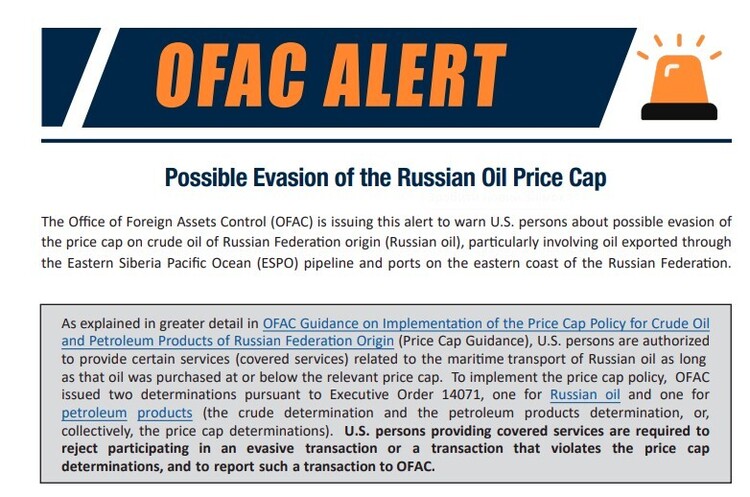The US issued a warning about schemes to circumvent the "price ceiling" for Russian oil
American companies, such as insurers and brokers, may be involved in the supply of Russian oil at higher prices than the ceiling

The U.S. Treasury Department's Office of Foreign Assets Control (OFAC) has issued a warning about schemes to circumvent the price ceiling for Russian oil. This is the first official acknowledgement that Russia is circumventing the ceiling, at least when supplying ESPO oil from Far Eastern ports.
The document does not provide specific examples of sanctions circumvention, but it does not rule out that American companies (insurers and brokers) deceived by "persons without US citizenship" may be involved in supplying oil at higher prices than the ceiling.
It also contains recommendations on how to prevent this from happening and avoid being held liable.
First, to pay attention to all cases of disabling tankers' AIS, which allows them to conceal entrances to Russian ports and oil transshipment at sea.
Second, it will require a breakdown of the delivery price into oil and transportation, customs, insurance, and other costs. The latter should not be overstated, as this would allow the true price of oil to be concealed. The counterparty's refusal to provide such documentation should be considered as an indication that the oil or oil products were purchased at a higher price than the ceiling.
Currently, India and China are almost the only buyers of Russian oil.
India's Finance Minister Nirmala Sitharaman recently told Bloomberg directly that if oil prices rise, the country will buy oil from Russia at a higher price than the ceiling for purely economic reasons:
"We have a large population, and we have to ensure affordable prices."
And almost all of ESPO's oil goes to China.
Bloomberg's weekly estimates show that Russian oil shipments by sea are not falling, despite claims of production cuts.
Meanwhile, the G7 members again left the price ceiling for Russian oil at $60 per barrel.
Background. Earlier it was reported that Russia sells oil under false documents to circumvent sanctions.
If you have read this article to the end, we hope that means it was useful for you.
We work to ensure that our journalistic and analytical work is of high quality, and we strive to perform it as competently as possible. This also requires financial independence. Support us for only UAH 196 per month.
Become a Mind subscriber for just USD 5 per month and support the development of independent business journalism!
You can unsubscribe at any time in your LIQPAY account or by sending us an email: [email protected]



